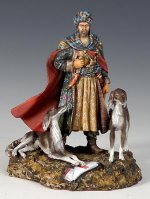Hey guys,
Here are some things to consider about Richard I.
Some consider Richard I not capturing Jerusalem as a failure. It was the goal of the 3rd Crusade to take Jerusalem back from the Muslims. From a religious perspective, it was a failure, but Richard knew that in the long term, Jerusalem could not be held. Take for instance the 1st Crusade. After the capture of Jerusalem in 1099 and the destruction of the Muslim army at Ascalon, the crusaders considered their pilgrim vows as completed and returned home. It left Godfrey approximately three hundred knights and two thousand footmen to protect the entire Latin Kingdom! The same situation would arise if Richard took Jerusalem. The crusaders would leave. Also, being so far from the coast, with a vulnerable supply line, the city would not hold. Consider instead what the situation of the Christians was at the time of his arrival in the Levant. The Christian forces barely had a foothold left in the Holy Land. Richard’s actions reversed most of Saladin’s gains. The Christians now held the coastal territory from Tyre to Jaffa. Pilgrims could now travel in the Levant and could even visit the holy places of Jerusalem. The taking of Cyprus was a huge strategic victory and played a very important role in the four centuries to come. Because of Richard, the Christian forces were able to maintain their presence in the holy land for another 100 years.
We have to remember first that he lived in the 12th Century. Things such as murder were as wrong then as they are now, but we need to realize that men in that time lived to a much different standard than we do today. The killing of the Muslim captives at Acre is just a continuation of many such executions of prisoners. At the Battle of Hattin for example, Saladin waited two days before he executed the members of the military orders and had those executions carried out by men who had no experience in using a quick and efficient method. Look at what Zengi did when he captured the city of Edessa which spurred the call to Crusade. (lead to the 2nd Crusade) Though these were horrible deeds from a moral perspective and very disgusting today in our modern view, these actions were not uncommon in this era. Saladin in turn killed every Christian captive from August 28th to September 10th in reprisal for the executions at Acre. Most of these things you can look up for yourself on Wikipedia on the Saladin article. I helped write a lot of it.
For roughly 400 years after the death of Richard I, British historians praised Richard in his reign. (This does not include those in a propaganda war against Richard from various other countries) Richard has since had many an English detractor. Many recent historians have questioned his reign of England. I recommend reading John Gillingham’s Richard I who writes on this matter to some degree. To keep this from being a very long post and since I am not an expert on anything, much less Richard’s domestic administration, I will include a quote from the book. According to Gillingham, in his opinion, the jury is still out on this subject since he cites many new charters which need to be examined and studied.
“If modern English historians have blamed him for neglecting his kingdom, this was not how contemporary commentators saw it. They praised him for going on crusade – though some, perhaps with the wisdom of hindsight, felt that he had been too generous to his brother John. If anything, they criticized him for too much government rather than too little. Those such as Ralph Coggeshall and Roger of Howden who lived through the heavy financial demands of the last years of Richard’s reign had a good reason to lament his “insatiable cupidity” and a country “reduced to poverty” by the oppression of judicial and forest eyres. Yet they acknowledged that the money was raised in order to fight wars in which the king had justice on his side – thus although the heavy demands he made on his subjects meant he was a flawed hero, they saw him none the less in a heroic light, just as Ambroise had done. Historians writing a little later and who had not had to pay Richard’s taxes found it even easier to see the hero.”
I believe another good barometer of Richard is the view his greatest adversaries had of him. The Muslims. As Gillingham states, they were not caught up in the internal power struggles of Europe and were therefore not “tainted” in their perspective. He was considered by the Muslims the leader of the crusade, as a great war leader, and a savvy politician and diplomat. On several occasions, Richard’s presence had such a profound effect on the Muslim army that Saladin struggled to keep effective control of his men. I recommend Beha Ed-Din’s book The Life of Saladin as a great view of Richard from the Muslim perspective. He was a very close friend of Saladin and was an eyewitness or in the know of all of Richards exploits.
I am much too sleepy to continue this for the evening. Maybe tomorrow.
Darrell



